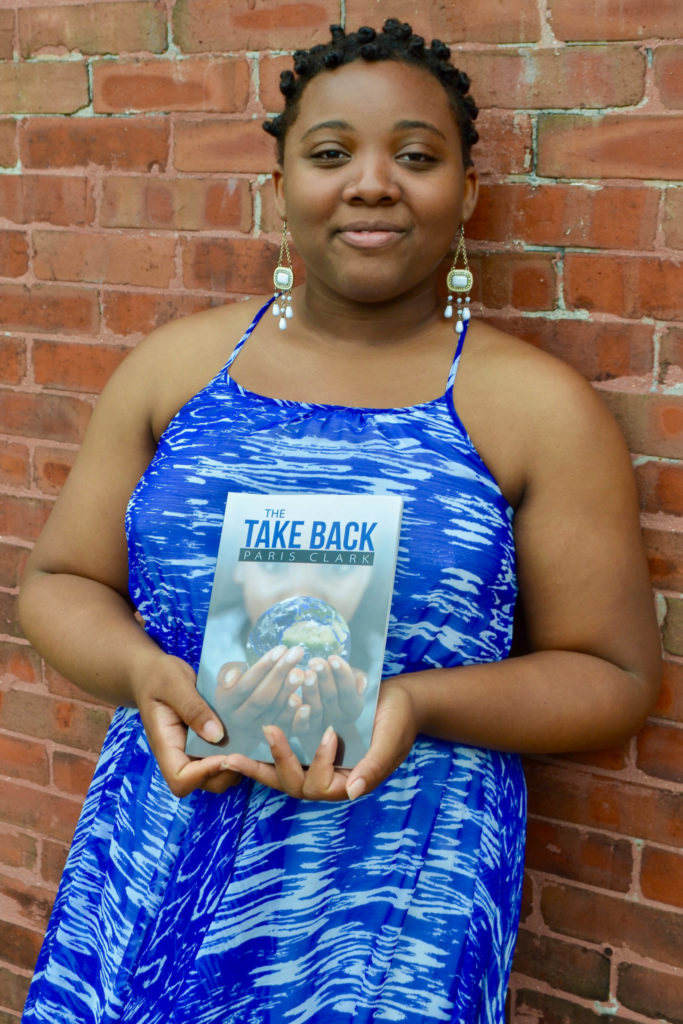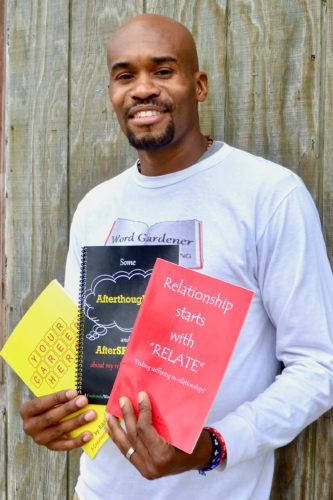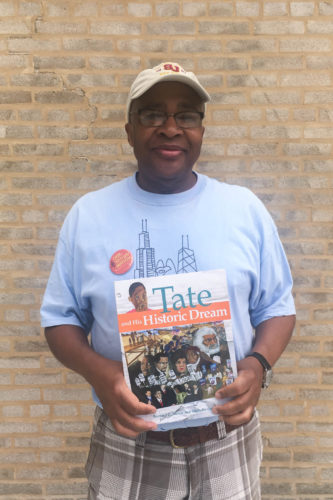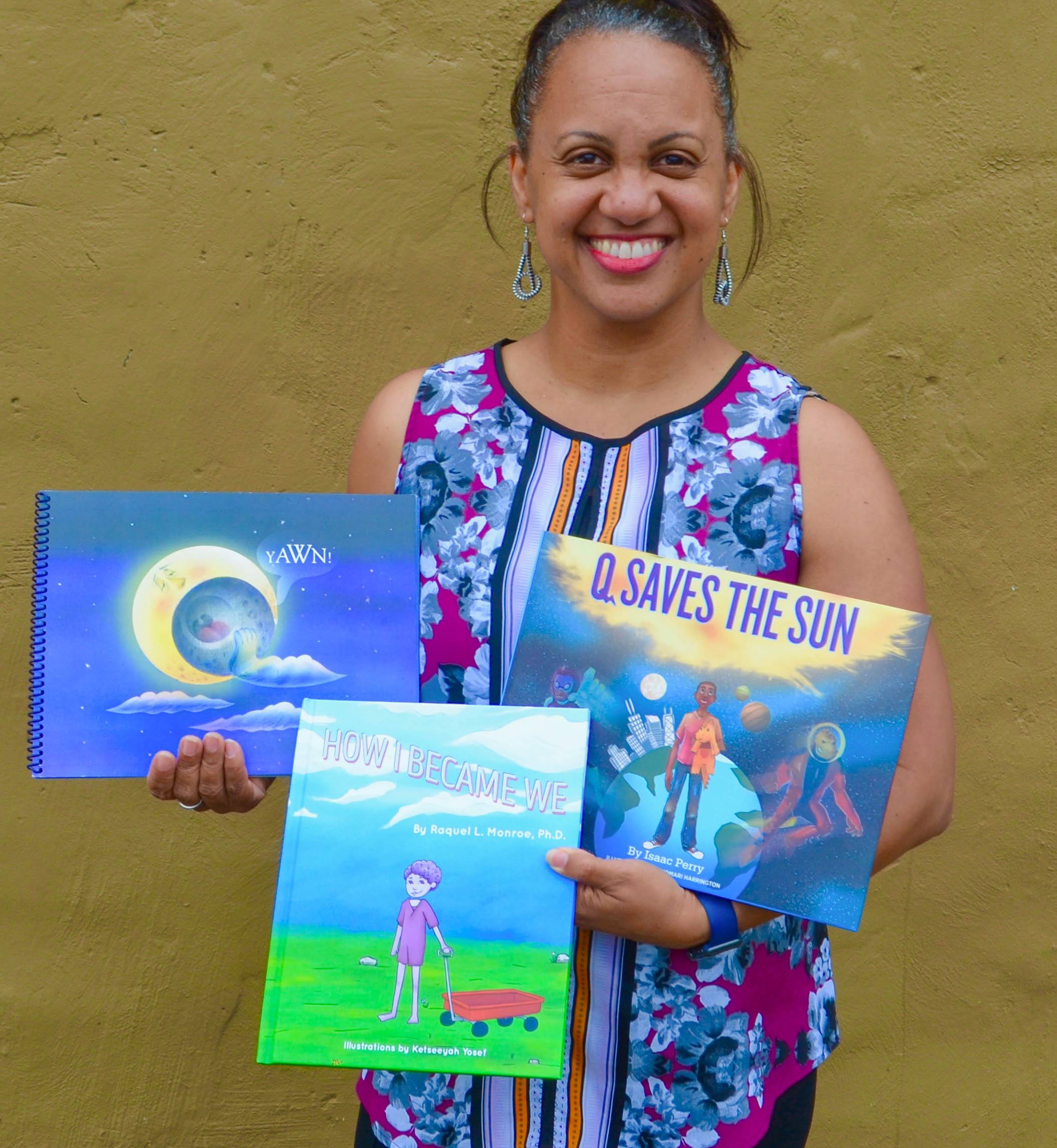Joy Triche, Tiger Stripe Publishing
Joy Triche stands behind a table strewn with books. One of the picture books has pages covered in purple space dust and aqua stars. On one page, a nine-year-old boy called Q is tucked into bed, as his father tasks him with an important mission with solar stakes. Turn the page over, and Q transforms into Super-Q, a dreamscape hero complete with electric blue gloves and a gleaming violet helmet.
But when Q isn’t zipping around space and dashing between galaxies, you can find him and his dad, an “L” train driver, on the South Side. Q, short for Qadeer, is African-American. The book, Q Saves the Sun, is a South Side production. Written by Isaac Perry and illustrated by Shomari Harrington, Q Saves the Sun is one of Tiger Stripe Publishing’s main titles.
Tiger Stripe Publishing takes its name from Sam and the Tigers, a children’s book that retells the racist story Little Black Sambo. Triche founded the independent publishing company in 2014 with the mission of increasing the number of books that feature underrepresented characters. She had wanted to start her own publishing company since she was in high school, but figuring out the mission of her company came from her experiences as a mother. Looking for books that her son could connect with, Triche realized that today, the offerings are still slim. “I knew that if I was having a problem, that it was probably an issue that other people were dealing with.”
Searching for the right children’s book is about more than just choosing the right message. Books and characters often stay with you on a fundamental level of relation. “One of my favorite children’s books growing up was The Snowy Day, and I grew up in Arizona, and I realized that I had nothing in common with Peter except that he was Black,” Triche recounted. “And so I think it’s important for children to see themselves reflected in books, whether we are cognizant of that or not as children.”
For a few years, Q Saves the Sun was Tiger Stripe Publishing’s only offering, but today at the Soulful Chicago Book Fair, Q is just one of Tiger Stripe’s many diverse characters. YAWN! The Yawn that Went ’Round the World travels the globe, while How I Became We features a purple gender-neutral character. Looking ahead, Triche hopes to publish books with Native American characters, and characters whose parents are in prison. At American Library Association (ALA) panels, Triche, who has worked on the ALA advisory board for the past three years, always finds interest in diverse books. “There’s always someone, a librarian especially, who comes up and says, ‘We need a book about this,’ ‘We need a book about this.’”
Diverse representation can be as simple as a child who wears glasses, Triche tells me. “It’s almost overwhelming to think about the number of ways that you can hit the different people who are in need of something that reflects them.” While conversation about diverse books has been increasing, and many big publishers have started filling the gap, Triche has reservations. “It’s trendy right now,” Triche explained, “[but] once it’s not a trend anymore, we will still be here focusing on diverse books.”
Publishers don’t usually get the opportunity to see and meet their readers, so book fairs like Soulful Chicago are rare glimpses for Triche to see Tiger Stripe’s impact. Recalling one experience at a book fair, Triche tells me how one boy grabbed a copy of Q Saves the Sun and dashed off. One hour later, he came back with his mother after grudgingly sifting through the fair’s other offerings, bought the book, sat right down on the tarmac, and finished it from cover to cover. “And he was Caucasian as a matter of fact.”
Paris Clark, The Take Back

“Self- wrapped into timelines / Self- found through double taps / Purpose found through a virtual ‘revolution’ / We have evolution ourselves / to document everything,” Paris Clark reads the first eponymous poem in her collection of poetry, The Take Back. She takes care to pause for beats and crafts rhythm with each syllable.
The Take Back is Clark’s first book. A recent graduate of Spelman College in Atlanta, Georgia, Clark grew up on the West Side in Austin.
It’s Clark’s second book fair. Her first was the Black History Month Book Fair in February, also organized by Asadah Kirkland, the founder of the Soulful Chicago Book Fair. When I first come across Clark’s stall, she is standing in front of her table, adjusting copies of her book into precise cascades. Her grandmother sits on the other side. “Normally I’m a big extrovert, love socializing, but for some reason, I felt kind of shy to just sell my own book,” Clark said. “But I thought about it, and I’m going to be my biggest seller, so I need to get up and advocate and sell.”
Many of the poems in The Take Back are deeply personal. After college, Clark returned to the West Side, and worked as an employment specialist at the nonprofit New Moms. “I worked with young women that were of my age, but the difference was, some of them were young mothers, some of them experienced homelessness or traumatic events that put them in our care, to need our services.”
“At that time, I would come home, and [poetry] was really my outlet,” Clark continued. “There were a lot of emotional days, and this was my self-care.” While Clark wrote many of the poems as a teenager, in 2015 and early 2016, she would write poems as a method of reflection and “finding out what was the difference between me and these young women, what led me down my path of ‘success,’ and then them struggling to find ways to make ends meet.” Collecting new and old pieces together, Clark hopes to highlight the Black woman’s experience in The Take Back and examine how environments shape people’s identities. Topics like faith, family, food deserts, and technology come up throughout the book.
For Clark, the poems are an exercise in reclaiming identity. The title of her debut book comes from this idea of ownership and self-possession. “You’re kind of taking back your self-identity, taking back your healing, taking back faith, regardless of where you may have dropped those off or along the path.”
Clark is hoping that through The Take Back, she can increase awareness of social injustices, and encourage other people to read, write, and reflect. One poem, titled “Catch-22,” is Clark’s rumination on violence within communities and violence acted upon communities. Another called “Sitting at Your Elder’s Feet” is a reminder to listen to others. Using poetry, Clark wants to send out a call-to-action.
As one of the youngest at the book fair, Clark knows she has a ways to go. What’s next for Clark? Her upcoming book, Where the Soulless Live, will be a break from poetry, as she explores today’s society through short stories that play on the seven deadly sins. Oh, and she’s possibly going to graduate school for an MBA; she sees her future in sustainable, community-focused entrepreneurship. “I need to continue on,” Clark said. “I need to just push forward. There’s no need for me to wait, because if this is my passion, then I should make time to do it.”
Eddie Rogers II

“There’s ten bullet points, pick one.” Eddie Rogers II opens his book, Relationship Starts with “Relate,” to a random page. He has just grabbed from a wooden heart-shaped shelf that doubles as a podium. The text on the page is entirely written in bullet points. A quick flip-through of the book shows that this is true for the book as a whole.
“Relationship should be an adventure, not torture,” I read. As I finish the sentence, Rogers has already begun expounding on the seven words, what they mean for relationships, how provocative they can be. “I didn’t tell you what to do, but that’s something to think about,” he finishes.
Bullet points and line breaks, bolded titles and emphatic punctuation (“!!!”), Relationship Starts with “Relate” is not organized by themes or steps. Rogers started writing two years ago. “I had a mess of notes everywhere. I had them on those thin pieces of paper straws come in, napkins, paper plates, real paper, all kinds of stuff, and I said, I can’t keep this mess anymore,” Rogers said. He typed his notes in bullet points, thinking that one day he would come back and rewrite them. “But when it came time to finish the book, I had over twenty pages of bullet points, and I thought, I’m just going to leave it in this order.” The final product is thirty-seven pages.
The book is a starting point. Filled with aphorisms and underlines, Relationship Starts with “Relate” is a slapdash, quick-start way to generate discussion about relationships. “This book is just full of bait,” says Rogers. The first time Rogers gave a talk on his book, what was a one-way speech to a crowd quickly became an active discussion. “It just started popping like popcorn. The conversation, I thought, was getting out of control,” Rogers recalled. “I thought, you know, I’m the speaker here, you guys should be listening to me. But then I realized, wait a minute, this is great!” Rogers begins snapping his fingers, and tells me, “Everybody has some feedback, everybody is involved, and I sat back and thought, ‘Yes, this is what I wanted.’ It’s generating conversation and changing the texture of relationship talks.”
Rogers’s philosophy, at its core, is simple. You already know what you want. You are your own relationship expert. “When you go out to eat, you know what’s going to make you sick; what tastes nasty to you; you know what was great to you last time,” he explained. “You know yourself in that way so you can eliminate eighty percent of the menu already…because you know yourself in that dietary way.”
Relationship Starts with “Relate” is just the first of Rogers’s three books. In the past two years, Rogers has also written Some Afterthoughts and AfterSHOCKS, a sequel to his first book, and YOUR CAREER HERO, a professional self-help book. Rogers currently works in social services for the state of Illinois (“I might write a book about that because I have a lot to say about that”), but hopes to become a full-time writer and speaker. Most of his writing has been motivated by one idea: “Don’t be late to your future.”
“I thought for a while that I was off schedule in getting to my future,” Rogers explained. “Once time is gone or misused, we can’t get it back and it’s a terrible thing. It’s almost like dropping a cellphone in Lake Michigan, and you just have to watch it go down. And unless you have scuba gear and plan on going to get it, it’s gone. And that feeling of ‘Oh no,’ I don’t want people to go through that.”
But Rogers doesn’t want any credit for his readers’ relationship or career successes and failures. His project is trying to get his readers to take charge over their own lives, and claim responsibility for their actions. “Just give me that peace sign or that ‘Hey, you gave me a lot to think about,’ but whatever you do after that is your business.”
Bernard Turner

“I think they taught more history when I was a kid,” says Bernard Turner. At sixty-nine years old, Turner is an author, historian, and tour guide, with seventeen years of docent experience at the Chicago History Museum under his belt. At Soulful Chicago Book Fair, Turner shows one facet of his experiences through his the children’s books and neighborhood tour guides. They’re informative and educational, with titles like Tate and His Historic Dream and Chicago Neighborhoods with Flavor: Getting Out of the Loop.
Turner founded Highlights of Chicago Press in 2002. His first book, A View of Bronzeville, is homage to the neighborhood he was born in. “That’s where I was born, and my father owned a gas station there,” Turner said. “And I wanted to be an expert in something. So I decided, that’s what I’m going to be an expert on.”
Turner’s work focuses on Black history, filling in the gaps left out in school curriculums. Stories that were once common knowledge, like that of Bud Billiken, are no longer familiar tales for today’s children. Recording these histories in digestible formats, finding traces of history in these neighborhoods today, Turner works to preserve culture. “Now they don’t get a chance to teach people about their culture and so forth, and I think that’s important,” Turner said. “There are kids out there who have never been to other neighborhoods, that’s a problem. That’s why we’re so fractured in this country.”
Turner himself enjoyed a cross-boundary upbringing. He was born in Bronzeville in 1948, when the racial covenants that prevented people from moving to other neighborhoods were overturned. He moved to Chatham, attended Hirsch High School, and through the Permissive Transfer Plan was able to attend Senn High School on the North Side. “Just imagine what an education that was, to go to another neighborhood, another school, where there [felt like] two hundred languages spoken in that school.”
At last year’s inaugural Soulful Chicago Book Fair, Turner found a warm reception to his books. People came to the book fair from as far as Evanston, and asked Turner to visit their schools. But bureaucracy is often the key barrier Turner faces in getting his books to children. “The Chicago Public Library [has] such a rigid system of acquiring books that independent people like me, I have to go and beg them…and it shouldn’t be like that.”
With Chicago Public Schools, Turner’s vending license gets him through the door. He fares better than other independent authors, but not because of the substance of his books. “They don’t look at the books before they give you a vending number,” Turner said. “They only look at your finances. That’s all they care about.”
Soulful Chicago Book Fair and its associated events, Black History Book Fair and Kwanzaa Book Fair, are an important step in opening up pathways for independent authors to get Black history books into children’s hands. These book fairs are some of the only Black-focused book fairs in the area. At Soulful Chicago Book Fair, Turner gets direct access to his readers. For independent authors, book fairs like these are opportunities to be visible to potential audiences, and get their books in readers’ hands with fewer barriers. But progress is slow-going. “It’s coming along,” Turner said, “but not nearly quickly enough.”
Did you like this article? Support local journalism by donating to South Side Weekly today.


Great article. Thanks for covering positive events like this.
This was such a great read and gave wonderful compliment to the Soulful Chicago Book Fair! Stellar job South Side Weekly!
I absolutely loved the article with the various authors. It gives me renewed hope and confidence that I can succeed too. I am a newly published, African American children’s author. My book is about an African American boy who believes in dreams and family. How can I get my book featured in the South Side Weekly?